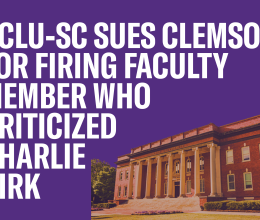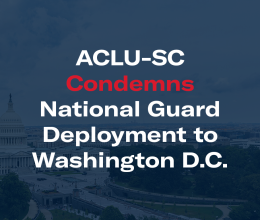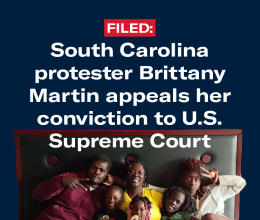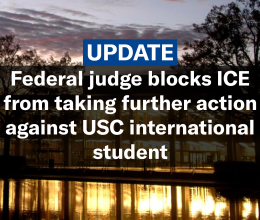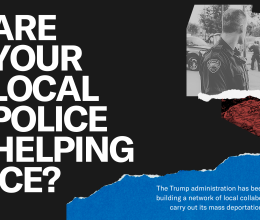In August 2016, students and their families filed a federal lawsuit challenging South Carolina’s “disturbing schools” law. The law allows students in school to be criminally charged for normal adolescent behaviors, including loitering, cursing, or other undefined “obnoxious” actions on school grounds. The ACLU also challenged a similarly vague “disorderly conduct” law, which prohibits students from conducting themselves in a “disorderly or boisterous manner.” The statutes violate due process protections of the Constitution.
The ACLU found that hundreds of students — some as young as 7 years old — were being charged under the far-reaching and nebulous “disturbing schools” law. The vague language of the statute had a chilling effect on students who speak out against policing abuses in schools in addition to often being enforced in a discriminatory manner. Black girls and boys were nearly four times as likely to be targeted under the law.
One of several plaintiffs, Niya Kenny, 19, was a former student at Spring Valley High School in Columbia. In October of 2015, she witnessed a violent altercation in her classroom when a school resource officer flipped a classmate over her desk, handcuffed, and dragged her across the room. Kenny, who is African American, spoke up against the officer’s actions. She was arrested and sent to a detention center.
Why this case?
These “disturbing schools” and “disorderly conduct” laws violate the Due Process Clause of the 14th Amendment. Because the language of these laws is so broad, students and school employees are left without clear guidelines as to what behavior is criminally prohibited, leaving students at risk of profiling and discrimination. Additionally, these laws impede students’ freedom of expression in schools. Consequently, as was the case with several plaintiffs, the laws can be construed in such a way that reporting and speaking about abuses in schools is labeled as obstructive and carries criminal repercussions. This carries dangerous implications for students’ ability to advocate for themselves and their classmates.
The latest
In 2017, the United States Court of Appeals for the Fourth Circuit overturned the district court’s judgment to dismiss, affirming that the vague language of the laws leaves significant room for unequal enforcement. Because Plaintiffs demonstrated that there was a risk to students of discriminatory or arbitrary enforcement of the vague language of the laws, the court remanded the case for further proceedings in district court. After the district court ruled that the vagueness of the laws was unconstitutional, the US Court of Appeals for the Fourth Circuit affirmed this decision in 2023.


